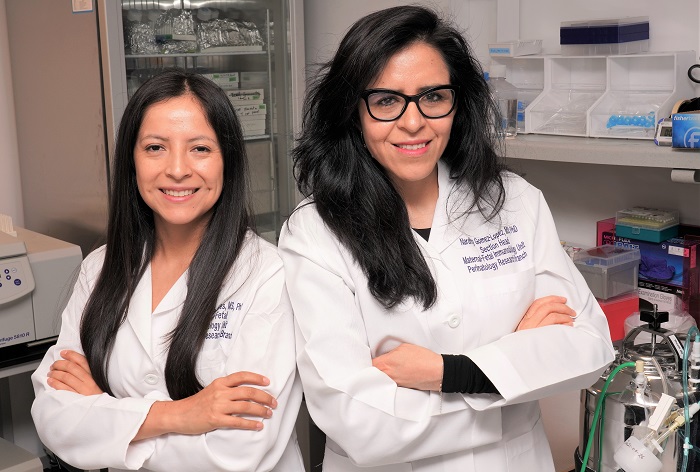
A published study from the research lab of Wayne State University’s Nardhy Gomez-Lopez, Ph.D., in a collaboration nearly 10 years in the making with researchers in Australia, provides evidence that the administration of homeostatic macrophages represents a potentially useful treatment for pregnant women at risk of preterm labor and birth.
Macrophages are cells that are part of the immune system. A large subset of spontaneous preterm births is triggered by infectious or sterile insults that converge on immune and inflammatory mechanisms.
Their main role, Dr. Gomez-Lopez said, is to protect against infection by releasing mediators, such as cytokines, and eating bacteria. Recent studies have also shown that macrophages can perform multiple functions, including promoting inflammation, called “pro-inflammatory macrophage,” or restricting inflammation, called “anti-inflammatory” or “homeostatic” macrophages.
The School of Medicine’s Dr. Gomez-Lopez is an associate professor of Obstetrics and Gynecology, section head of the Maternal-Fetal Immunobiology Unit and deputy project site manager for Translational Science at the Perinatal Research Initiative, in support of the National Institutes of Health’s Perinatology Research Branch at WSU.
The administration of homeostatic macrophages has been tested as a treatment for other human diseases, which suggested it may be a viable option for use during pregnancy.
“Macrophages exert homeostatic actions in pregnancy to protect against preterm birth and fetal inflammatory injury” is included in JCI Insight, an experimental medicine journal.
“Until now, there was a unidimensional view of macrophages as simply being pro-inflammatory, cytokine-producing immune cells that participate in the last stage of pregnancy -- parturition. In our study, we discovered the macrophages act like the sentinels of late pregnancy. These cells are homeostatic because their deficiency can lead to preterm birth and fetal injury, and therefore these immune cells are required for pregnancy maintenance and fetal development,” Dr. Gomez-Lopez said. “We also showed that administering these homeostatic macrophages can prevent preterm birth and fetal injury in a murine model of inflammation of the amniotic cavity. Therefore, our study provides two main contributions to the field: one, that macrophages are more important for successful pregnancy and fetal development than was previously realized; and two, that the administration of such homeostatic macrophages can prevent preterm birth and the resulting poor neonatal outcomes.”
The work spanned several years and was performed in collaboration with University of Adelaide Professor Sarah Robertson, Ph.D., the former director of the Robinson Institute in Adelaide, Australia.
The concept of macrophages as beneficial during late pregnancy was inspired by studies Dr. Gomez-Lopez carried out as a postdoctoral fellow in Dr. Robertson’s laboratory nearly 10 years ago.
The publication includes detailed work from earlier experiments performed in Australia by Dr. Gomez-Lopez and other researchers working in Dr. Robertson’s group.
A second set of experiments involving the treatment of a pregnant animal model with homeostatic macrophages was carried out at WSU in collaboration with the Perinatology Research Branch.
“The latter effort was spearheaded by a highly talented researcher, Dr. Valeria Garcia-Flores, who performed this research as a postdoctoral fellow and was recently appointed as an assistant professor,” Dr. Gomez-Lopez said.
Additional research is required to validate such a treatment. Drs. Robertson and Gomez-Lopez continue collaborating in the field of Maternal-Fetal Immunology.
The study was supported by Australia’s National Health and Medical Research Council project grant APP1140916 to Dr. Robertson; funds from the Wayne State University Perinatal Initiative in Maternal, Perinatal and Child Health to Dr. Gomez-Lopez; and the Perinatology Research Branch, Division of Obstetrics and Maternal-Fetal Medicine, Division of Intramural Research, Eunice Kennedy Shriver National Institute of Child Health and Human Development, N.I.H., U.S. Department of Health and Human Services.